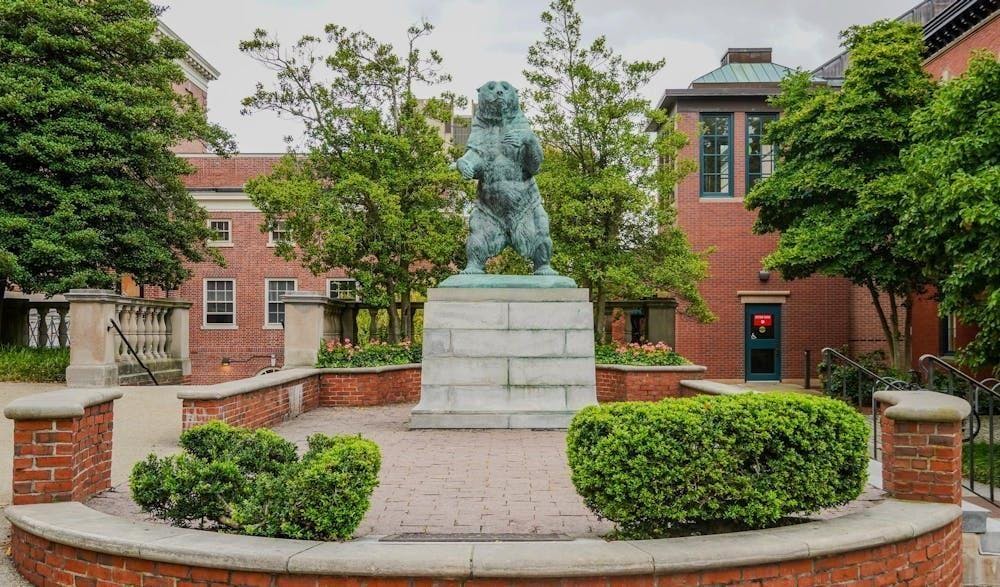This week, the Cogut Institute for the Humanities hosted a two-day academic conference discussing the prevalence of non-Zionist Jewish traditions throughout history.
The Non-Zionist Jewish Traditions Conference, held between Feb. 3 and 4, included a variety of panels and roundtables featuring 21 speakers and moderators from Brown, Princeton, Cornell and other universities. The conference aimed to address the evolving relationship that Zionism and the State of Israel have with different Orthodox communities and various ideological traditions.
Prior to the conference, the Cogut Institute received over 1,500 emails in protest of the event, according to conference organizers.
The main complaint voiced in the emails sent to the Cogut Institute was that the conference was “antisemitic, racist” and that it “erases Zionism from history,” said Visiting Professor of Humanities and Middle East Studies Adi Ophir, a conference organizer.
While the emails’ origins are unclear, some were sent by the Rhode Island Coalition for Israel, according to Ken Schneider, a RICI board member. RICI also protested outside of Andrews House on both days of the event.
Ophir noted that events hosted at Andrews House typically don’t feature any security. But in response to the emails, this event had a “heavy” security presence, Ophir said.
The email campaign prompted engagement from the University’s Office of Event Strategy and Management, the University’s Multi-Partial Team and the Department of Public Safety to ensure that the conference would “proceed smoothly,” Cogut Institute Director Amanda Anderson, a professor of English and humanities, wrote in an email to The Herald. The new security protocol included three DPS staff, two external security guards and one additional event staff.
On the first day of the conference, eight protestors from RICI stood outside the building. The second day saw three protestors, including Schneider. RICI members held up signs that read, “Anti-Zionism is Anti-Semitism,” “We stand with Israel” and “Free Hugs” while playing Jewish folk songs.
Schneider said that RICI “tried very hard” to get the conference canceled.
On Monday, DPS asked the protestors to move across the street because they were on “Brown’s property,” according to Schneider. On Tuesday, a DPS officer approached the protestors and asked them to lower the volume of their music.
But the protestors “didn’t bother us,” Ophir said. “They bothered other classes.”
“In a certain sense, the resistance is a sign that (the conference) is actually needed,” said Shaul Magid, a visiting professor at Harvard who was a member of the conference convening committee.
“A lot of people felt that we needed to convene and think of alternatives to the reality we live in,” Magid added.“There are non-Zionist traditions within the Jewish tradition that have somehow been marginalized, erased and it's worth it to rethink again about what those are.”
The event was co-sponsored by the Department of History and the Department of Religious Studies and convened by Professor of Holocaust and Genocide Studies Omer Bartov, Professor of European History Professor Holly Case and Professor of Comparative Literature Peter Szendy, as well as Ophir and Magid.
Last February, Ophir attended a speaker event hosted by Jonathan Greenblatt, where some students walked out in protest. Ophir recalled that Greenblatt started his lecture by saying, “Anti-Zionism is antisemitism.” Ophir began planning the conference soon after.
The conference began with a panel held by Magid, Bartov and Sarah Hammerschlag, a religion and literature professor at the University of Chicago. Harry Merritt MA’14 PhD ’20, who spoke at a later panel, found the introduction “thought-provoking.”
“As a Brown alumnus, this interdisciplinary conference felt like an exemplary manifestation of the Cogut Center’s mission,” Merritt said. “The tendency by this conference’s detractors to conflate non-Zionism with anti-Zionism and anti-Zionism with antisemitism only points to the urgent need to define and analyze these terms theoretically and to contextualize them historically.”
Prior to the conference, Hammerschlag received an email which read, “Why do you hate Jews?” While many of Hammerschlag’s colleagues received similar emails, the majority of emails sent in protest were sent to the Cogut Institute.
The event was initially advertised to the public via Events@Brown and various on-campus email publications. The Cogut Institute did not advertise the event on social media.
But “word-of-mouth was far-reaching,” Anderson said. Spots filled up ten days before the event, shortly after the promotion began.
Jeremy Gold ’26 came to the event after hearing about the conference from friends.
“I’ve been thinking a lot about my relationship with Zionism and the State of Israel,” Gold said. He added that non-Zionist traditions in history are very “polarizing” and “hard to talk about.”
Eitan Zemel ’26, another attendee, said that his “main takeaway is that there are a lot more histories to learn, and there are so many different frameworks for understanding the political situation in the land as well as the history of divergent Jewish ideologies.”
David Litman, a conference attendee and a Senior Analyst for the Committee for Accuracy in Middle East Reporting and Analysis, thought the conference lacked Zionist representation. He continued that non-Zionist teachings are becoming increasingly popular in academia, a trend he says is not reflected in “mainstream Judaism.”
The events of the conference made two things “very clear,” Ophir concluded in his closing statement: “This conversation must continue and must expand.”

Hadley Carr is a university news editor at The Herald, covering academics & advising and student government.





